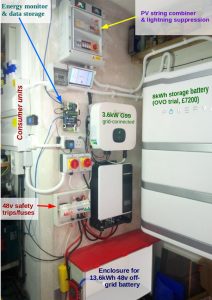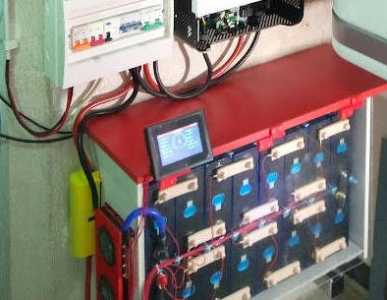That's the way to go @batalto The cost of lithium batteries has been steadily falling whilst energy-prices have been rocketing.
That means the break-even point is now surprisingly short.... around two years.
At the beginning of this week my local Borough Councillor wrote to tell me that a West Country dairy farmer was paying about £5 per cow per month to keep the milking parlor and bulk storage tank running. For an average-sized herd with two milkings each day, that equates to a £1000 electric bill per month.
I will be contacting local dairy farmers as a matter of urgency. They need to know that there are alternative strategies available.
@editor - I don't know if you're still 'in contract' or have dropped onto the Standard Variable Tariff. This affects what you might wish to complain about.
However, the Ofgem guidance for Energy Suppliers is that they can require a customer on monthly direct debit to keep sufficient funds in their account that they cover at least the following month's bill. That rule reflects the fact that we are effectively paying in arrears. The first year of a new contract consists of 11 payments, not twelve.
If your Supplier is increasing your DD beyond this then you have the right to demand that the monthly payment is reduced.
Some Suppliers are now increasing DDs on the basis that the customer's account would be in debit by the end of the contract term.
That reasoning is sound, but only holds true if that customer is actually within a contract. The logic can't possibly apply to consumers who are simply using the Standard Variable Tariff because the Supplier can't possibly predict when they will switch to a different Supplier.
I have been briefed as to how the complaints system should work by a very helpful employee at the Office of the Energy Ombudsman. The first step is to download a copy of the actual Complaints Procedure from your particular Supplier. They are not all identical!
I also strongly advise against using telephone calls to handle any aspect of a complaint. You need proof that the process has been followed in order for the case to be accepted by the Ombudsman. Email is the best option because you retain a copy with a date/time stamp.
Save energy... recycle electrons!
@robl, we've spent a lot of time insulating the property – just did a stint this week sealing gaps between window frames and we're going to be 'painting' the house with a masonry cream this summer that will lock in more heat. From a heat loss perspective we're quite pleased with where we are. Despite all of this, running the heat pump 24/7 will still consume well over 50kWh on mild-cold days because the heat pump is just ticking over. At current and potentially higher tariffs come October, this starts to become unaffordable.
Get a copy of The Ultimate Guide to Heat Pumps
Subscribe and follow our YouTube channel!
The case for batteries is undoubtedly stronger than it has ever been and it's something we're looking at very seriously.
Get a copy of The Ultimate Guide to Heat Pumps
Subscribe and follow our YouTube channel!
@editor if you are looking strongly at batteries I would recommend you DO NOT go with what installers offer you. They are well overpriced. If you want easy get the 5kwh pylontechs. £1500 for 5kwh is the cheapest premade battery you are probably going to find in the short term. They are literally plug and play as long as you have a hybrid inverter/charger.
https://www.itstechnologies.shop/products/pylontech-us5000-4-8kwh-95-d-o-d-battery-storage
Whether you go with what installers recommend depends on how you intend to deploy the batteries.
If they are configured as part of a set up which includes the possibility of grid-export, then you are constrained by the regulations around MCS accreditation and G98/99 export approval from your DNO.
OTOH, if you are heading in the direction of off-grid storage to run 240v AC equipment (as I am) then there are very few rules which apply. And that includes safety regulations!
A hybrid off-grid installation means you'd be paying about £2000 for 14kWh storage with BMS (Battery Management System). But you then need to learn how to put it together with the right tools.
You pay a hefty premium to manufacturers of off-the-shelf storage batteries, such as Pylontech, to avoid learning the DIY approach.
Save energy... recycle electrons!
@transparent I wonder if your dairy farmer heard: https://www.bbc.co.uk/programmes/m00120bp where they cool their milk for daily storage by transferring the heat from the milk to warm their swimming pool, then use the heat from the pool to warm the milk back up for producing cheese (if I remember correctly).
Posted by: @transparentA hybrid off-grid installation means you'd be paying about £2000 for 14kWh storage with BMS (Battery Management System). But you then need to learn how to put it together with the right tools.
Is that £2,000 for all the kit?
Get a copy of The Ultimate Guide to Heat Pumps
Subscribe and follow our YouTube channel!
That's £2000 for the battery cells and the BMS, which is the electronic box that provides balancing and protection. I'm including an approximate amount for (thick) cables, a fuse and a trip.
You'll need to house them somehow. The cells don't run hot, but a busbar bolt which isn't at the required torque will heat up. So I've used some off-cuts from Fermacell, a cementatious wall-board.
You could equally well decide to use a kitchen wall cupboard. It's about the right size, but try to buy from Howdens because they use the more substantial 18mm thick high-density chipboard.
On top of that you require an inverter. The type depends on what you're trying to achieve. Allow £1000+.
I'm already having this conversation with others. See the dialog between @batalto and I over here a month ago.
Save energy... recycle electrons!
@transparent to be fair you don't need to spend £1k on the inverter. Mine is just the Sofar ME3000SP and they aren't that much. You can even get used one on eBay for a few hundred.
https://www.ebay.co.uk/sch/i.html?_from=R40&_trksid=p2380057.m570.l1313&_nkw=sofar+me3000sp&_sacat=0
Posted by: @bataltoto be fair you don't need to spend £1k on the inverter.
That's true. But I'm also allowing some headroom for the double-pole mains isolator, cabling, mains changeover switches, trips and the DIN-rail enclosure.
The ball-park figures I've just given should be sufficient for @editor to decide whether to buy-in server-rack batteries such as PylonTech offer or proceed down the DIY route.
There's a bit more to this than just bolting the bits together.
You need crimp-tools, torque wrench etc. and a qualified electrician to make the mains connections.
And there's some background knowledge required, such as how to first connect the battery to the inverter without the inrush current to the capacitors blowing the logic on the electronics board.
Even so, that still leaves a huge gap between the cost of the DIY route (off grid) and getting pre-built modules installed by a professional.
As I'm a designer, I don't see myself wanting to start up a supply/installation business for the required DIY component parts.
It's no threat to me if this Forum becomes another of the online places where end-users can find out how to build their own off-grid battery system.
Save energy... recycle electrons!
Hi Newbie,
Because of its high specific heat capacity, water makes an excellent means of storing heat energy. I feel we should be making more use of this to help reduce our carbon footprint.
- 26 Forums
- 2,367 Topics
- 53.7 K Posts
- 103 Online
- 6,042 Members
Join Us!
Worth Watching
Latest Posts
-
RE: Solis S6-EH1P8K-L-PLUS – Why I Chose It and What I’ve Learned So Far
@majordennisbloodnok To be honest, when I spoke with...
By Batpred , 5 hours ago
-
RE: Changing from 4-port buffer to volumizer
@andy1618 see the very sage advice from @editor above. ...
By JamesPa , 7 hours ago
-
RE: New Fogstar 15.5kWh upright solution
The video shows the JK balancer, but the connection of ...
By Batpred , 10 hours ago
-
RE: Ecodan unable to hit legionella target temp - what's the consensus?
@9jwr9 Hi, yes this is the issue with every (stand alon...
By ASHP-BOBBA , 11 hours ago
-
RE: Help me keep the faith with my air source heat pump installation
@adamk FWIW I managed unintentionally to 'coax' mine in...
By JamesPa , 12 hours ago
-
RE: Help needed with Grant Aerona 3 issues
Ok please post back once experiment complete. Give it ...
By JamesPa , 12 hours ago
-
RE: Octopus Cosy Heat Pump Owners & Discussion Thread
You are in essence right. Adia only works with selecte...
By JamesPa , 13 hours ago
-

No, you haven’t missed out, @batpred. This thread’ll st...
By Majordennisbloodnok , 13 hours ago
-

RE: Tesla Powerwall – More of a ‘Luxury’ Than an ROI Winner!
Also, though they weren’t prepared to match the price t...
By Toodles , 14 hours ago
-
RE: How long will your energy contract last?
My INTELLI-FIX-12M-25-08-29 has less than 12 months to ...
By Batpred , 14 hours ago
-

RE: GivEnergy 2025 forthcoming batteries and inverters
Then, perhaps @toodles , you should've made a submissio...
By Transparent , 15 hours ago
-
RE: Balancing financial efficiency and comfort using the Octopus Cosy tariff
I am wondering if anyone with an EV could find the 7p/k...
By Batpred , 15 hours ago
-
Possibly, but it would also reduce DeltaT across the em...
By JamesPa , 15 hours ago
-

RE: ASHP sizing - value of Heat Transfer Coefficient
@cathoderay It was reminiscent of the BBC Open Universi...
By Toodles , 15 hours ago
-
-

@morgan They are unsupervised these days, can’t get the...
By Toodles , 4 days ago
-

RE: Setback savings - fact or fiction?
Exactly. We only need to compare conditions, to decide ...
By cathodeRay , 5 days ago
-
RE: Need Help Optimising My Rushed ECO4 Install: 12kW Bosch Heat Pump
Welcome @mickamills We too have an oversized 12kW Sa...
By Old_Scientist , 5 days ago
-
RE: My Powerwall 3 Consumes 3-4 kWh/Day in Self-Consumption: Is This Normal?
@caron I can confirm that the power usage of the PW3 is...
By Old_Scientist , 5 days ago








